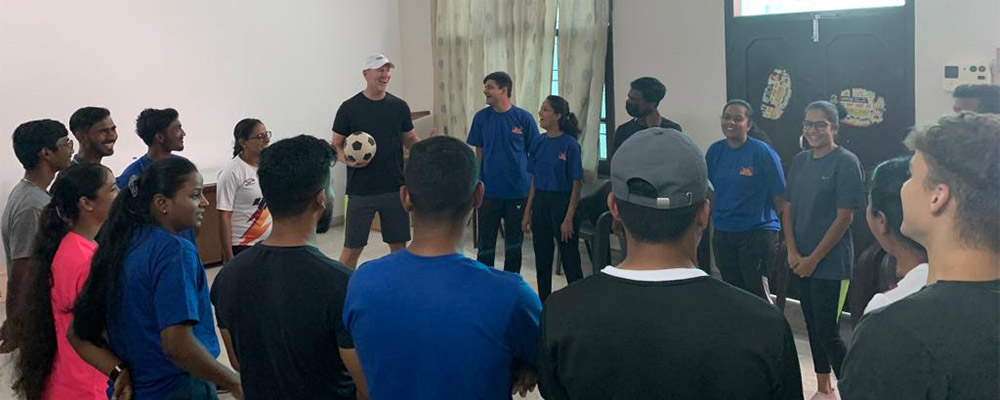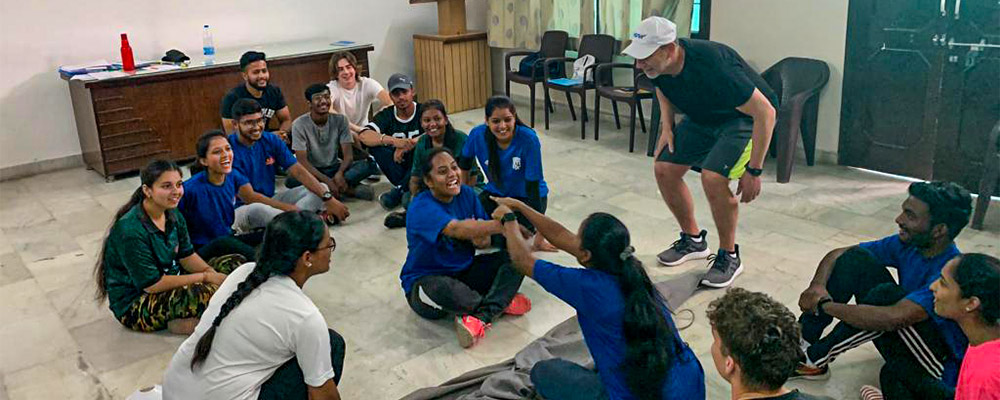 The air feels heavy as temperatures hang around 40C in the Punjab village of Rurka Kalan, India. Dr. Stephen Berg has travelled to the region several times before, but feeling that heat in late May doesn’t get any easier.
The air feels heavy as temperatures hang around 40C in the Punjab village of Rurka Kalan, India. Dr. Stephen Berg has travelled to the region several times before, but feeling that heat in late May doesn’t get any easier.
The last time he had visited the area, he had brought teacher candidates as part of their Community Field Experience in 2019. The group had travelled with the UBCO Women’s Soccer team for Sport for Development India: Empowering Children through Sport and Play program, offered through UBC Go Global. The program works in partnership with the local non-profit organization Youth for Change (YFC) to offer soccer education and it provided an opportunity for candidates to offer workshops on wellness, physical literacy, cooperation and leadership.
Now, in April 2022, Dr. Berg was asked by YFC if he could develop and teach curriculum for a new program, Playing for Peace, the organization would be coordinating with Common Goal.
The program educates youth and young adult leaders (approximately ages 17 to 22) to become ‘peace agents’ as part of their role as sports coaches for children and youth.
“The vision is that these young people are empowered to create positive change in their communities by learning leadership skills,” says Dr. Berg, “So while this training program was held in India, it had participants from Africa, Asia, Europe, Latin America and the Middle East.”
A month to prepare curriculum for a global program was a tight timeline, but fortunately Dr. Berg had developed some similar courses in the past that he could build upon and adapt. The classrooms in the rural community are basic with only a handful of chairs, a fan and a flip chart easel. As the Wi-Fi is very sporadic Dr. Berg had to design activities that could mainly be done without access to the internet. At times, because of the heat, the power would go out in the entire village.
“You need to work with what you have,” says Dr. Berg. “In addition, for planning for no to low resources, we also needed to overcome a language barrier. A majority of the youth leaders had some level of English and we were fortunate to have a few translators, but it would often mean I would deliver my instructions and then there would be a pause and you wouldn’t know if everything you said was understood.”

In one of his activities that focused on cooperation, he used bean bags, balls and small objects to have the students experience what it means to cooperate and trust each other to be successful.
“A lot of these participants were in conflict countries, like India and Pakistan. We begin the activity by talking what it means to cooperate and conflict resolution. We then toss the bean bags back and forth as a group and you keep adding in more objects so they need to work as a group to be successful.”
Following the activity, the group sits down and reflects on what they learned. Following the program, the group takes the activities and concepts they’ve learned back to their countries and implements the lessons with the teams they coach.
“It’s really a global connection, and there are children in Brazil, Pakistan and Germany right now doing these activities and learning about conflict resolution, peace building and leadership skills which more than ever are important right now.
It’s estimated that there will be 5,000 children and youth that will go through this program around the world. In November, Dr. Berg will go back to India for a summit on the program — and he can’t wait.
“India keeps drawing me back and it’s largely because of the people. They are some of the nicest, genuinely amazing people I’ve ever met.”